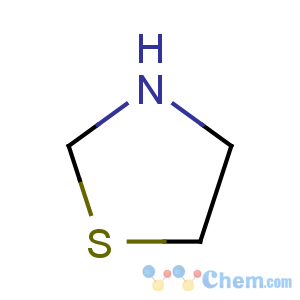4-Chlorobutyryl chloride
-
- Product Name4-Chlorobutyryl chloride
- CAS No.504-78-9
- Purity98% or order
- Min Quantity1000Kilograms
- Price10~15

 View Contact Detail
View Contact Detail
-
 Molecular Structure
Molecular Structure
Detailed Description
Thiazolidine is a heterocyclic organic compound with a 5-membered saturated ring with a thioether group and an amine group in the 1 and 3 positions, respectively. It is a sulfur analog of oxazolidine.Derivatives, generally referred to as thiazolidines, are known. For example, the drug pioglitazone contains a thiazolidine ring. It is a drug usually indicated in cases of type II diabetes for decreasing blood sugar. It also decreases triglycerides and C-reactive protein levels. It lowers blood pressure and increases levels of HDL. Another drug which contains a thiazolidine ring is the antibiotic drug penicillin.
Thiazolidines may be synthesized by a condensation reaction between a thiol and an aldehyde or ketone. The reaction is reversible. Therefore, many thiazolidines are labile towards hydrolysis in aqueous solution. Hydrolysis of the thiazolidine generates the thiol and aldehyde or ketone from which it was synthesized.
Thiazolidine with 2 ketones (at the 2 and 4 positions) provides the functional group of the thiazolidinediones.